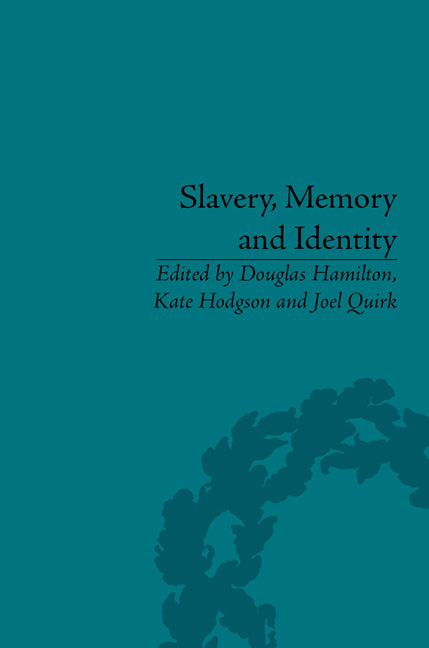Book contents
- Frontmatter
- CONTENTS
- Acknowledgements
- List of Contributors
- Introduction: Slavery, Memory and Identity: National Representations and Global Legacies
- 1 ‘A Thoroughly National Work’: The Politics of Blame and European Abolitionist Identities
- 2 From Slave Quarters to Wigwams: Native American Slaveholding and the Debate over Civilization
- 3 For Civilization's Sake: Legal Abolition of Slavery in Nepal and Sierra Leone in a Global Perspective, 1920–30
- 4 The Heritage of Slavery and Nation Building: A Comparison of South Africa and Mauritius
- 5 Picturing Slavery: The Perils and Promise of Representations of Slavery in the United States, the Bahamas and England
- 6 ‘History Must be Re-Written!’: Revisionist Ambitions among West African Slave Descendants
- 7 Contrapuntal Memories of Slavery and Abolition in the French-Speaking World
- 8 Public Memory of Slavery in Brazil
- 9 Learning to Remember and Imagine Slavery: The Pedagogies of Museum Field Trips in the Representation of ‘Difficult’ Histories
- 10 Slavery and Racism as the ‘Wrongs’ of (European) History: Reflections from a Study on Portuguese Textbooks
- Notes
- Index
10 - Slavery and Racism as the ‘Wrongs’ of (European) History: Reflections from a Study on Portuguese Textbooks
- Frontmatter
- CONTENTS
- Acknowledgements
- List of Contributors
- Introduction: Slavery, Memory and Identity: National Representations and Global Legacies
- 1 ‘A Thoroughly National Work’: The Politics of Blame and European Abolitionist Identities
- 2 From Slave Quarters to Wigwams: Native American Slaveholding and the Debate over Civilization
- 3 For Civilization's Sake: Legal Abolition of Slavery in Nepal and Sierra Leone in a Global Perspective, 1920–30
- 4 The Heritage of Slavery and Nation Building: A Comparison of South Africa and Mauritius
- 5 Picturing Slavery: The Perils and Promise of Representations of Slavery in the United States, the Bahamas and England
- 6 ‘History Must be Re-Written!’: Revisionist Ambitions among West African Slave Descendants
- 7 Contrapuntal Memories of Slavery and Abolition in the French-Speaking World
- 8 Public Memory of Slavery in Brazil
- 9 Learning to Remember and Imagine Slavery: The Pedagogies of Museum Field Trips in the Representation of ‘Difficult’ Histories
- 10 Slavery and Racism as the ‘Wrongs’ of (European) History: Reflections from a Study on Portuguese Textbooks
- Notes
- Index
Summary
It was the Declaration of the Rights of Man and of the Citizen, from 1789, which started to consecrate equality for all human beings. In the XIX century, several laws emerged forbidding slavery. Portugal was the first European country to grant freedom (alforria) to slaves and to declare the end of slavery.
– Year 8 history textbookMany Western countries pride themselves on eradicating racism and abhor the idea that racism is still very much alive in all segments of society. Research that links slavery and colonialism to present day racism poses all kinds of problems for deeply entrenched models of identity and community. Decolonizing the mind means opening the chambers of taboo in the study on slavery and colonialism and its effects on contemporary societies.
– S. Hira, ‘Decolonizing the Mind’ (2010)Introduction
History teaching is a particularly interesting sphere for the analysis of national and European imaginaries on identity, the nation and ‘race’. As Carolyn Boyd argues, ‘history teaching and textbooks legitimate existing political arrangements and provide clues to national identity and destiny’. Moreover, textbooks are especially appropriate objects for analysis in the Portuguese context, as they are the most-used pedagogic resource in classrooms and are required to follow the official syllabus; they can thus be seen as the ‘curriculum de facto’. Our aim is to show how exploring the teaching of slavery and colonialism in Portugal reflects on Eurocentrism and racism and engages with the specific contexts in which history is produced and consumed, particularly in textbooks.
This chapter draws on a multidisciplinary research project that aimed at exploring the construction of Eurocentrism in Portuguese history textbooks. The project lasted for three and a half years (2008–12) and was centred on three elements: (1) an analysis of textbooks and education policy; (2) interviews and focus groups with diverse actors; (3) participatory workshops, aiming to expand the social impact of the project.
- Type
- Chapter
- Information
- Slavery, Memory and IdentityNational Representations and Global Legacies, pp. 151 - 166Publisher: Pickering & ChattoFirst published in: 2014



